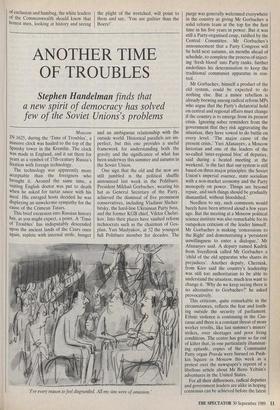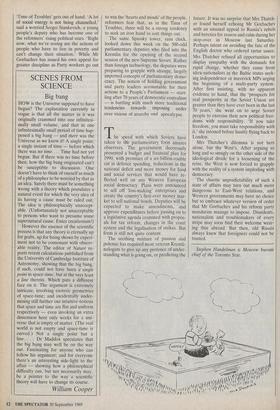ANOTHER TIME OF TROUBLES
Stephen Handelman finds that
a new spirit of democracy has solved few of the Soviet Unions's problems
Moscow IN 1625, during the 'Time of Troubles', a massive clock was hauled to the top of the Spassky tower in the Kremlin. The clock was made in England, and it sat there for Years as a symbol of 17th-century Russia's fixation with foreign technology.
The technology was apparently more acceptable than the foreigners who brought it. Around the same time, a visiting English doctor was put to death when he asked for tartar sauce with his meal. His enraged hosts decided he was displaying an unwelcome sympathy for the cause of the Crimean Tatars.
This brief excursion into Russian history has, as you might expect, a point. A 'Time of Troubles' has indisputably descended upon the ancient lands of the Czars once again, replete with internal strife, hunger and an ambiguous relationship with the outside world. Historical parallels are im- perfect, but this one provides a useful framework for understanding both the gravity and the significance of what has been underway this summer and autumn in the Soviet Union.
One sign that the old and the new are still jumbled is the political shuffle announced last week in the Politburo. President Mikhail Gorbachev, wearing his hat as General Secretary of the Party, achieved the dismissal of five prominent conservatives, including Vladimir Shcher- bitsky, the hard-line Ukrainian Party boss, and the former KGB chief, Viktor Chebri- kov. Into their places have vaulted reform technocrats such as the chairman of Gos- plan, Yuri Maslyukov, at 52 the youngest full Politburo member for decades. The 'I've every reason to feel disgruntled. All my sins were of omission.' purge was generally welcomed everywhere in the country as giving Mr Gorbachev a solid reform team at the top for the first time in his five years in power. But it was still a Party-organised coup, ratified by the Central Committee. Mr Gorbachev's announcement that a Party Congress will be held next autumn, six months ahead of schedule, to complete the process of inject- ing 'fresh blood' into Party ranks, further underlines his determination to keep the traditional communist apparatus in con- trol.
Mr Gorbachev, himself a product of the old system, could be expected to do nothing else. But a minor rebellion is already brewing among radical reform MPs who argue that the Party's dictatorial hold on central and regional affairs must change if the country is to emerge from its present crisis. Ignoring sober reminders from the government that they risk aggravating the situation, they have vowed to do battle on every level. 'The major cause of the present crisis,' Yuri Afanasyev, a Moscow historian and one of the leaders of the so-called 'inter-regional bloc' of deputies, said during a heated meeting at the weekend, 'is the fact that our system is still based on three major principles: the Soviet Union's imperial essence, state socialism with a non-market economy and the Party monopoly on power. Things are beyond repair, and such things should be gradually dismantled, without bloodshed.'
Needless to say, such comments would barely have been uttered aloud a few years ago. But the meeting at a Moscow political science institute was also remarkable for its outspoken criticism of the leader himself. Mr Gorbachev is making 'concessions to the Right' and demonstrating a 'persistent unwillingness to enter a dialogue,' Mr Afanasyev said. A deputy named Kudrik from Sverdlovsk called Mr Gorbachev a 'child of the old apparatus, who shares its prejudices'. Another deputy, Cherniak, from Kiev said the country's leadership was still too authoritarian to be able to understand the situation, much less want to change it. 'Why do we keep saying there is no alternative to Gorbachev?' he asked provocatively.
This criticism, quite remarkable in the circumstances, reflects the fear and loath- ing outside the security of parliament. Ethnic violence is continuing in the Cau- casus and there is a constant threat of more worker revolts, like last summer's miners' strikes, over shortages and poor living conditions. The centre has gone so far out of kilter that, in one particularly illuminat- ing episode, copies of the Communist
Party organ Pravda were burned on Push- kin Square in Moscow this week as a protest over the newspaper's reprint of a libellous article about Mr Boris Yeltsin's adventures in the United States.
For all their differences, radical deputies and government leaders are alike in hoping consensus can be achieved before the latest 'Time of Troubles' gets out of hand. 'A lot of social energy is not being channelled,' said a worried Sergei Stankevich, a young people's deputy who has become one of the reformers' rising political stars. 'Right now, what we're seeing are the actions of people who have to live in poverty and can't change their situation.' While Mr Gorbachev has issued his own appeal for greater discipline as Party workers go out to win the 'hearts and minds' of the people, reformers fear that, as in the Time of Troubles, there will be a strong tendency to seek an iron hand to sort things out.
The same Spassky tower, sans clock, looked down this week on the 500-odd parliamentary deputies who filed into the Kremlin for the opening of the second session of the new Supreme Soviet. Rather than foreign technology, the deputies were preparing to grapple with strange, largely imported concepts of parliamentary demo- cracy. The notion of holding government and party leaders accountable for their actions to a People's Parliament — start- ling after 70 years of democratic centralism — is battling with much more traditional tendencies towards imposing order over visions of anarchy and apocalypse.
The speed with which Soviets have taken to tire parliamentary form amazes observers. The government decorously presented a budget and financial plan for 1990, with promises of a six-billion-rouble cut in defence spending, reductions in the national deficit and more money for food and social services that would have re- flected well on any Western European social democracy. Plans were announced to sell off loss-making' enterprises and create the country's first-ever money mar- ket to sell national bonds. Deputies will be expected to make amendments, and approve expenditures before passing on to a legislative agenda crammed with propos- als for tax reform, changes in the court system and the legalisation of strikes. But form is still not quite content.
The seething mixture of passion and polemic has required most veteran Kremli- nologists to give up any pretence of under- standing what is going on, or predicting the future. It was no surprise that Mrs Thatch- er found herself echoing Mr Gorbachev with an unusual appeal to Russia's rebels and heretics for reason and calm during her stop-over in Moscow last Saturday. Perhaps intent on avoiding the fate of the English doctor who ordered tartar sauce, Mrs Thatcher refused all opportunities to display sympathy with the demands for rapid change, whether they came from ultra-nationalists in the Baltic states seek- ing independence or maverick MPs urging the beginning of a multi-party system. After first insisting, with no apparent evidence to hand, that the 'prospects for real prosperity in the Soviet Union are greater than they have ever been in the last 70 years,' she went on to urge Soviet people to exercise their new political free- doms with responsibility. 'If you take freedom, you must take responsibility with it,' she intoned before hastily flying back to London.
Mrs Thatcher's dilemma is not hers alone, but the West's. After arguing so long and so smugly on the other side of the ideological divide for a loosening of the reins, the West is now forced to grapple with the reality of a system imploding with democracy.
The chaotic unpredictability of such a state of affairs may turn out much more dangerous to East-West relations, and Western governments may have no choice but to embrace whatever version of order that Mr Gorbachev and his reform party mandarins manage to impose. Dissidents, nationalists and troublemakers of every stripe may soon find their welcome wear- ing thin abroad. But then, old Russia always knew that foreigners could not be trusted.
Stephen Handelman is Moscow bureau chief of the Toronto Star.



























































 Previous page
Previous page